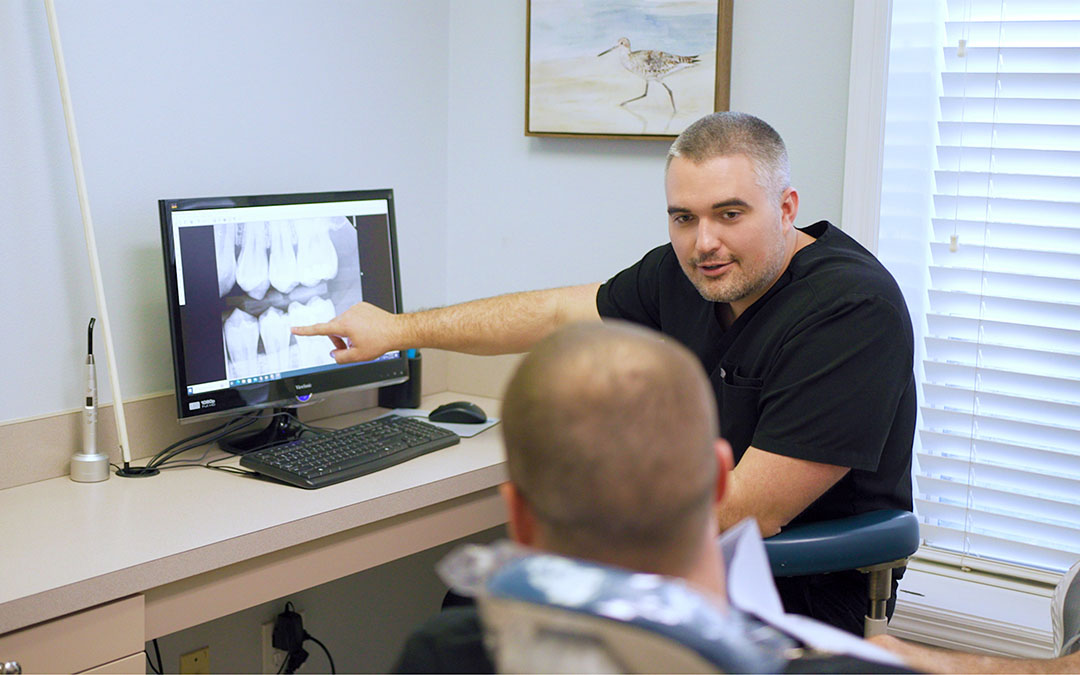Do you find yourself wincing when you sip a hot coffee or bite into an ice cream cone? Tooth sensitivity is a common problem that can make even simple pleasures uncomfortable. That sudden jolt of pain is often a sign that something isn’t quite right with your dental health. Fortunately, our Ocala dentist can help you understand why your teeth have become so sensitive so you can find relief and prevent further discomfort.
Here’s how we can address the root cause of tooth sensitivity to once again make the enjoyment of your favorite foods and drinks possible.
How Sensitive Teeth Often Feel
The biggest symptom if you have is radiating pain, much like a toothache. More specifically, the discomfort is at the roots of the affected teeth.
Sensitivity becomes more obvious when consuming hot, cold, sweet, or acidic foods and beverages. Cold air, brushing and flossing teeth, or using alcohol-based mouthwash can also result in discomfort. Symptoms can range from mild to intense and appear when triggered. Interestingly, not every tooth may be affected equally.
Causes of Tooth Sensitivity
Because having sensitive teeth is a commonly shared condition, several factors could be at play. Some individuals even experience tooth sensitivity naturally due to age. Our dentist will need to inspect your teeth and gums to determine what the exact cause is before we recommend treatment.
Sensitive teeth may be caused by:
- An exposed tooth root
- Worn tooth enamel
- Fractured teeth
- Fillings that are worn or damaged
- Gum disease
- Tooth decay or cavities
- Aggressive brushing
- Grinding or clenching of teeth at night (bruxism)
- Regular consumption of acidic foods or beverages
Treatment Options on Deck
Fortunately, there are . The caveat, however, is that the treatment depends on the cause of sensitivity. To get started, our dentist will need to perform a dental exam to check your mouth.
The findings from the examination will then influence the ultimate decision on treatment. If you have , we may recommend a desensitizing toothpaste or a softer toothbrush. A fluoride gel applied to your teeth to strengthen enamel may also prove helpful.
For more severe cases, treatment options may include a:
- Gum graft for receding gums
- Root canal procedure
- Custom-made night guard to discourage grinding
Underlying medical conditions contributing to sensitivity should also be treated separately to prevent further damage to enamel.
Prevention Tips to Follow
Assuming you are not predisposed to sensitive teeth, there are ways to prevent the condition altogether. You may have to make a lifestyle adjustment, such as watching the foods that you eat. Other tips are easy, like regularly practicing oral hygiene habits.
Tooth enamel serves as the hard, protective layer for your teeth. When this covering wears down, the layer beneath your enamel, dentin, becomes exposed. Dentin is less dense and contains small, hollow tubules. Exposed tubules allow cold, hot, or acidic food and beverages to better reach the nerves and cells inside the tooth. This causes sensitivity.
Work to prevent tooth sensitivity by following these tips:
- Don’t brush too hard and use a soft toothbrush
- Limit how much you indulge in acidic foods or drinks, i.e., soda, candy
- Seek treatment for teeth clenching or grinding to protect enamel
- Ask our dentist about current or future teeth whitening as it can result in sensitivity
- Brush your teeth at least twice a day and floss daily
- Stay away from abrasive toothpaste
Ask Dr. Pruitt for Help
Our dentist in Ocala, FL, wants you to have a healthy smile free from pain. If you’re noticing a certain amount of sensitivity when you go about your day, it’s best to speak up and see what treatment is possible. Call Pruitt Dentistry today at (352) 732-3985 to request an appointment.


